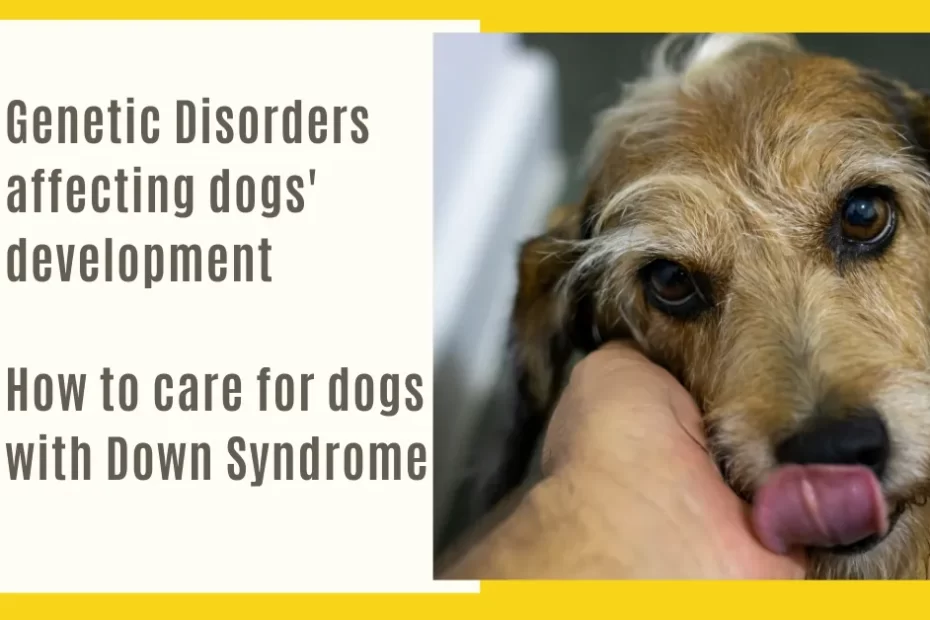Canine Genetic Disorders: Down syndrome is a genetic condition that affects dogs, similar to its impact on humans. While it can result in specific physical and behavioral differences, dogs with Down syndrome can still enjoy happy and healthy lives with the appropriate care and support.
Understanding Canine Genetic Disorders: What Every Dog Owner Should Know
Can Dogs Have Down Syndrome?
Many pet owners are interested in whether dogs can have Down Syndrome like humans. Down Syndrome in humans is caused by an extra copy of chromosome 21, which leads to a range of physical and cognitive developmental issues.
Dogs, however, have a different chromosomal setup, and the exact replication of human Down Syndrome in canines has not been scientifically documented.
In dogs, while a direct equivalent to Down Syndrome is not observed, they can experience their unique genetic disorders.
These disorders might share some superficial similarities with Down Syndrome, such as developmental delays or certain physical traits, but they are genetically distinct. Canine genetic anomalies can arise from various chromosomal irregularities, but they don’t align perfectly with the human chromosome 21 trisomy that defines Down Syndrome.
Understanding Down Syndrome in Dogs
Down syndrome in dogs is caused by an extra copy of a specific chromosome, which can lead to physical and behavioral differences. Some of the most common symptoms of Down syndrome in dogs include:
- Facial abnormalities
- Joint abnormalities
- Cognitive difficulties
- Increased susceptibility to specific health problems
Common Canine Genetic Disorders
Dogs can suffer from various genetic disorders, some of which may resemble aspects of human conditions. These include:
- Chromosomal Abnormalities: Like trisomy, where dogs have an extra chromosome, leading to developmental challenges.
- Congenital Heart Defects: Some breeds are predisposed to heart problems due to genetic factors.
- Hip Dysplasia: Common in larger breeds, this genetic disorder affects the hip joint, leading to arthritis or lameness.
- Brachycephalic Syndrome: Found in dogs with short noses (like Bulldogs), causing breathing difficulties.
- Hereditary Cataracts: A genetic condition leading to early blindness in some dog breeds.
Each of these disorders affects dogs differently and can impact their quality of life in ways that range from mild to severe.
Canine Genetic Disorders – Signs and Symptoms
It’s essential to recognize signs and symptoms in your dog, especially if you suspect they may have Down syndrome or any other health condition. While these indicators may not conclusively confirm the presence of Down syndrome, they can signal potential health issues that require attention.
If you observe any of the following symptoms in your dog, it is advisable to consult with a veterinarian for a comprehensive evaluation:
- Hearing Problems: Dogs with Down syndrome may exhibit hearing difficulties, manifesting as slow responses or failing to react promptly to auditory cues. These difficulties may be attributed to cognitive factors related to the syndrome or, in some cases, hearing impairment. Identifying hearing issues early on is crucial for understanding and addressing your dog’s unique needs.
- Down Syndrome dogs are often the slowest to follow or react to cues from other dogs. This can be cognitive or due to impaired hearing.
- Skin Problems / Abnormal Skin Patches: Skin problems are relatively common in dogs with Down syndrome and can be attributed to impaired liver function or a compromised immune system. These issues may manifest as:
- Heavy Shedding: Dogs with Down syndrome may experience excessive shedding, leading to fur loss and an uneven coat.
- Missing Fur Patches: Some dogs may develop areas with missing fur, which can be unsightly and may lead to skin sensitivity.
- Sensitivity to Household Irritants: Down syndrome dogs may be more sensitive to minor household irritants and fragrances, which can lead to allergies or skin-related health concerns. Identifying and mitigating these sensitivities can contribute to their overall well-being.
- Skin problems are common in Down Syndrome dogs. These problems are caused by poor liver function or a weakened immune system. The dogs might shed heavily or have missing fur patches. They might also be sensitive to minor household irritants and scents, which can lead to allergies and other health issues.
- Poor eyesight/vision loss: Down syndrome can affect a dog’s overall development and visual acuity. This often leads to weak eyesight, and they may develop conditions such as cataracts. Cloudiness in one or both eyes can indicate cataracts, requiring veterinary evaluation and potential treatment.
- Canines with Down syndrome have poor overall development, which often leads to weak eyesight. They may develop cataracts. Cloudiness may mean cataracts in one or both eyes.
- Thyroid problems: Malfunctioning thyroid glands can disrupt a dog’s metabolism and temperature regulation. As a result, dogs with thyroid problems may have a lower body temperature than healthy dogs. Identifying and managing thyroid issues is crucial for maintaining health and comfort.
- A malfunctioning thyroid can affect metabolism and temperature. Dogs with thyroid problems often have lower temperatures than healthy dogs.
- Congenital heart disease: Dogs with Down syndrome may be at an increased risk of congenital heart disease. While this condition can have a wide range of presentations, monitoring your dog’s heart health and seeking professional guidance if you notice any irregularities is essential.
- Facial features / Flat Nose: Some dogs with Down syndrome may exhibit distinct facial features, such as a flatter nose. While these features may not necessarily impact their health, understanding these physical traits can help identify potential health concerns accompanying Down syndrome.
- Hair Loss: Hair loss can be another symptom of Down syndrome in dogs. If your dog experiences unusual or excessive hair loss, consult a veterinarian to rule out underlying health issues.
- Dry Noses: A persistently dry nose can indicate various health concerns, including allergies, skin problems, or underlying medical conditions. Monitoring your dog’s nose health can help detect potential issues early on.
Caring for Dogs with Genetic Disorders
Caring for dogs with genetic disorders requires a specialized approach tailored to each dog’s needs. Key aspects include:
- Veterinary Care: Regular check-ups with a veterinarian are crucial for early detection and management of genetic disorders.
- Specialized Diets: Some genetic disorders may require dietary adjustments to manage symptoms or prevent complications.
- Physical Therapy and Exercise: Dogs with physical impairments may benefit from physical therapy to improve mobility and strength.
- Medications and Supplements: Certain conditions might require ongoing medication or dietary supplements.
- Environmental Adjustments: Changing the dog’s living environment can help accommodate physical limitations and enhance comfort.
- Emotional Support: Dogs with genetic disorders often need additional emotional support and bonding time with their owners.
Is There Any Link Between Dog Genetics, Diarrhea In Dogs
Some breeds are more predisposed to gastrointestinal issues. For example, breeds like German Shepherds and Labrador Retrievers are often associated with sensitive stomachs or food allergies. These genetic factors can make them more likely to experience diarrhea when exposed to specific triggers or stressors.
However, it’s important to note that genetics aren’t the only factor at play. Environmental factors, diet, and overall health can also contribute to a dog’s risk of diarrhea. For instance, consuming spoiled food, drinking contaminated water, or being exposed to parasites can all lead to gastrointestinal upset. Additionally, a dog’s immune system plays a crucial role in their ability to fight off infections and maintain a healthy digestive tract.
While genetics may make some dogs more prone to diarrhea, you can take steps to minimize the risk. Essentials include providing a high-quality, balanced diet, ensuring access to clean water, and avoiding exposure to potential pathogens. Regular veterinary check-ups can help identify and address underlying health issues contributing to diarrhea.
In conclusion, genetics can undoubtedly influence a dog’s susceptibility to diarrhea, but it’s not the sole determining factor. Genetic, environmental, and dietary factors can contribute to gastrointestinal problems. Understanding these factors and taking proactive steps to manage your dog’s health can significantly reduce their risk of experiencing diarrhea.
The Link Between Canine Genetic Disorders & Diarrhea In Dogs
There’s a connection between a dog’s genes and their chances of getting diarrhea. Some breeds are more prone to sensitive stomachs or allergies, leading to a runny tummy. But it’s not just about genetics; their diet, environment, and overall health also play a significant role.
If your pup has trouble with diarrhea, it’s best to check with a vet. They can determine what’s causing the problem, whether it’s a genetic issue or something else. And hey, who knows? Maybe there’s a special diet or treatment that can help your pup feel better.



Does your dog have separation anxiety? Try making homemade treats to keep them occupied and ease their stress when you’re away
Share your stories or tips about caring for special needs pets. Let’s create a supportive and loving community for every pet parent out there.
Please tell me what are your concerns.
Dogs with chromosomal abnormalities may have physical and developmental differences, but they’re just as capable of giving and receiving love. They might just need a bit extra care.
Genetic disorders in our pets can be complex, but there’s always hope and ways to manage their well-being. Have you considered consulting with a vet who specializes in genetic conditions? They might offer tailored advice for your furry friend’s specific needs. Wishing you both resilience and healing!